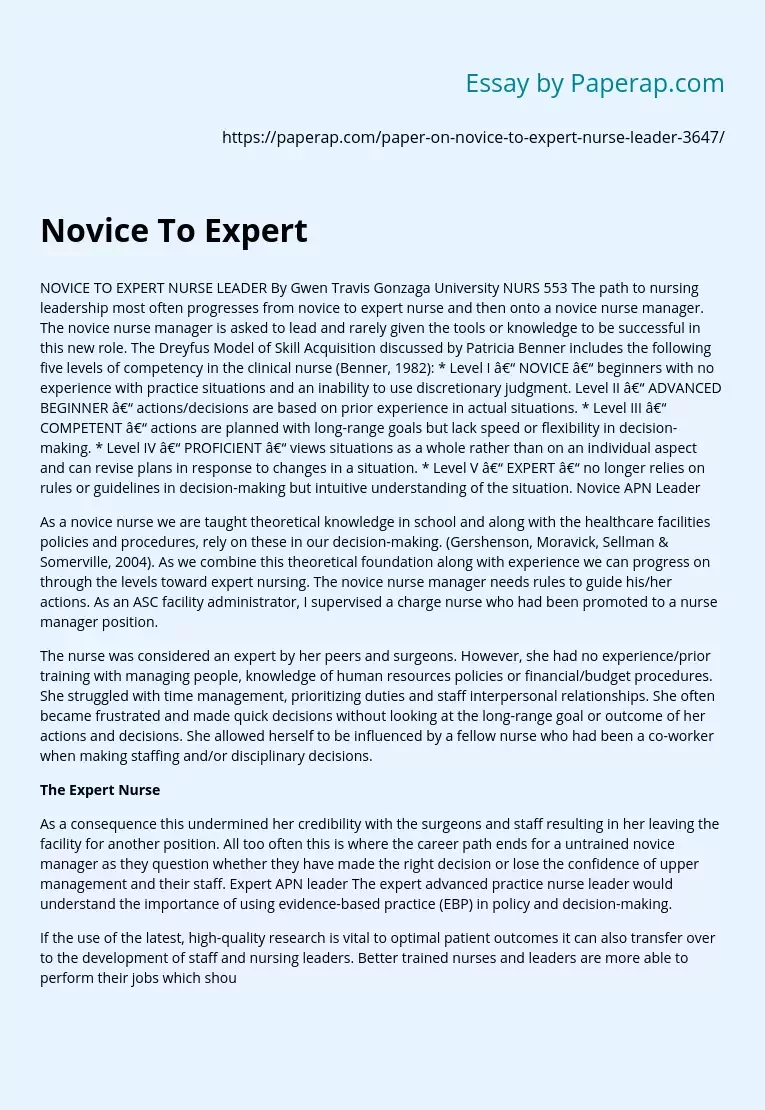Novice To Expert
NOVICE TO EXPERT NURSE LEADER By Gwen Travis Gonzaga University NURS 553 The path to nursing leadership most often progresses from novice to expert nurse and then onto a novice nurse manager. The novice nurse manager is asked to lead and rarely given the tools or knowledge to be successful in this new role. The Dreyfus Model of Skill Acquisition discussed by Patricia Benner includes the following five levels of competency in the clinical nurse (Benner, 1982): * Level I – NOVICE – beginners with no experience with practice situations and an inability to use discretionary judgment.
Level II – ADVANCED BEGINNER – actions/decisions are based on prior experience in actual situations. * Level III – COMPETENT – actions are planned with long-range goals but lack speed or flexibility in decision-making. * Level IV – PROFICIENT – views situations as a whole rather than on an individual aspect and can revise plans in response to changes in a situation. * Level V – EXPERT – no longer relies on rules or guidelines in decision-making but intuitive understanding of the situation.
Novice APN Leader
As a novice nurse we are taught theoretical knowledge in school and along with the healthcare facilities policies and procedures, rely on these in our decision-making. (Gershenson, Moravick, Sellman & Somerville, 2004). As we combine this theoretical foundation along with experience we can progress on through the levels toward expert nursing. The novice nurse manager needs rules to guide his/her actions. As an ASC facility administrator, I supervised a charge nurse who had been promoted to a nurse manager position.
The nurse was considered an expert by her peers and surgeons.
However, she had no experience/prior training with managing people, knowledge of human resources policies or financial/budget procedures. She struggled with time management, prioritizing duties and staff interpersonal relationships. She often became frustrated and made quick decisions without looking at the long-range goal or outcome of her actions and decisions. She allowed herself to be influenced by a fellow nurse who had been a co-worker when making staffing and/or disciplinary decisions.
The Expert Nurse
As a consequence this undermined her credibility with the surgeons and staff resulting in her leaving the facility for another position. All too often this is where the career path ends for a untrained novice manager as they question whether they have made the right decision or lose the confidence of upper management and their staff. Expert APN leader The expert advanced practice nurse leader would understand the importance of using evidence-based practice (EBP) in policy and decision-making.
If the use of the latest, high-quality research is vital to optimal patient outcomes it can also transfer over to the development of staff and nursing leaders. Better trained nurses and leaders are more able to perform their jobs which should lead to the goals of improved patient care and expert staff retention. As research shows, there are several key factors involved in the development of an expert nurse manager which includes: mentorship, communication and positive feedback. (Gershenson, et al, 2004) Mentorship is critical for a novice nurse manager to assist with recognizing the changes of their new role.
Constructive feedback provided by a mentor provides the novice with the benefits of years of experience and knowledge and is necessary for a novice nurse manager’s success. Effective mentorship and communication are also crucial as good (expert) leaders continue to develop their own skills and knowledge as “one can only lead others as far as they have gone themselves. ” (Rizzo, 2005) An expert nurse manager/leader will see the organization and staff as a whole when planning, implementing or the revision of policies or practices.
The expert advanced practice (AP) nurse leader would not have fallen victim to allowing the manipulation of a single staff member in decision-making the influenced the staff as a whole. We as APN leaders should strive to break the tradition of training future nursing leaders through “trial and error” and assist our colleagues in building the skills used in EBP within our practice settings. EBP must be a component when developing, implementing and evaluating current practices in future staff and leadership development as employees are an organization’s greatest resource and “a developing employee is a motivated employee. (Rizzo, 2005) References Benner, P. (1982). From novice to expert. The American Journal of Nursing, 82(3), 402-407. Retrieved from EBSCOhost. Gershenson, T. , Moravick, D. , Sellman, E. , & Somerville, S. (2004) Career scope: Northeast. Expert to novice: a nurse leader’s evolution. Nursing Management, 35(6), 49-52. Retrieved from EBSCOhost. Rizzo, M. D. , (2005). Tools for Novice Health Care Clinical Administrators. The Health Care Manager, 24(1), 3-11. Retrieved from EBSCOhost.
Novice To Expert. (2019, Dec 05). Retrieved from https://paperap.com/paper-on-novice-to-expert-nurse-leader-3647/

